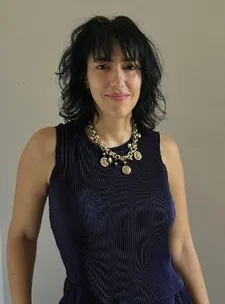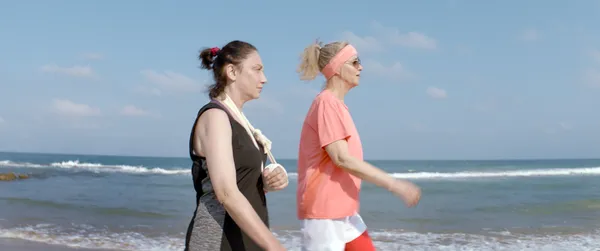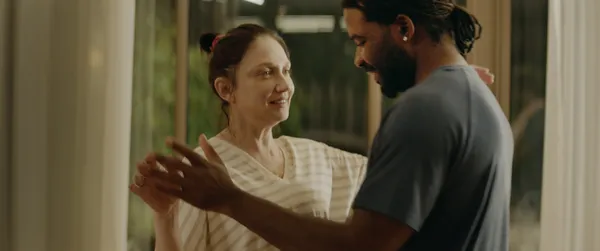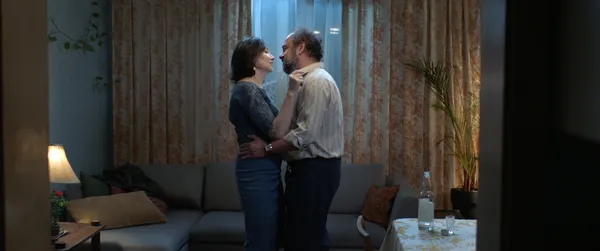The two worlds of a Polish migrant worker are explored in Or Sinai’s impressive debut film Mama. Mila (Evgenia Dodina), works for an upper middle-class couple in Israel, a long-standing arrangement which has also seen her strike up an affair with the gardener (Martin Ogbu), but after a minor accident, she is sent home to Poland to recuperate, where she finds reconnecting with her husband (Arkadiusz Jakubik) and young adult daughter Kasia (Katarzyna Łubik) is not as simple as she had hoped. Sinai’s film explores familial love and the stresses placed upon it by migrant work from an unusual angle that retains sympathy for all the characters involved. We caught up with Sinai shortly after the film had its premiere in Cannes to talk about her inspiration, writing process and the challenge of shooting the film in two countries.
Looking at what you’ve said about the film and the way that Mama is dedicated to several people at the end, it seems as though it comes from a very personal place.
Or Sinai: I grew up in a very patriarchal family, my father was the dominant provider and my mother was the quiet housewife until she couldn't do it any more because, unfortunately, she got Parkinson’s disease many years ago. A few years ago they decided to bring an immigrant worker into their home and, in that case, it was a Ukrainian woman, and it really affected me. The fact that we have another person in the house and suddenly she became the housewife that my mother couldn't be any more.
 |
| Or Sinai on working in two countries: 'It was a challenge but it was also super-fun' Photo: Matan Radin |
It added a layer of complexity to my image of womanhood. Of course, in the beginning it was a bit awkward for my parents and I could feel that they were trying to pretend as if she wasn't there – but I saw her and she was a person and I started talking to her, and she was really funny and cool and she told me stories about her family back home, and she told me stories about her lover in Israel. It amazed me because I think that we are used to looking at immigrant workers as sacrificing and that they are poor people trying to help their families. It was the first time that I realised that, in the meantime, they build these temporary identities – her life is full, even in Israel. That's what got me into the story and then it became a very big job of research.
I spoke with men and women about their lives and, originally, the film was planned to be shot in Ukraine. So, I was there talking to many women also, and all of these women helped me to build the story and the character.
I know you had to relocate the location to Poland after the invasion of Ukraine, but that does make you realise what a universal thing the business of migrant workers is, people coming from all over the world to work in order to build for a better future back home.
OS: It took us a while to get back to the story because we were so involved with the Ukraine and we had our co-producer, who went to the military suddenly, and I was there for for a while so it really affected everything.Then we had to relocate the story and we thought of many options, Romania, some other places and eventually Poland just made sense. We met nice partners and I realised that it makes the abortion element of the story even stronger because of the sad situation there.
Turning to the craft of the film, there’s exceptional camerawork from your cinematographer Matan Radin that really keeps us in Mila’s headspace. A handheld kind of language that’s moving with her. How did you work with him to establish that?
OS: It was my intention from the beginning that I wanted to experience everything with Mila and I wanted the audience to have her perspective all of the time. So we started shaping this language and Matan, my DoP, is very talented and he had the ability to be super-sensitive with the camera. I love the fact that when he felt that he needed to get closer or he needed to make a movement, it was super free and we always started with a rehearsal with the actors because we wanted them to feel free to do whatever they wanted, not that the camera would dictate their mise en scene. After we realised their mise en scene, we started working the camera around them.
You also use the camera in quite an expressionistic way to convey Mila’s journey to and from Israel, which is an interesting stylistic choice. Can you tell me about that?
OS:For a long time, it was a mystery how to do this transition. First of all, we couldn't manage to shoot the aeroplane or in the airport, it's too complicated and too expensive and we wanted something creative that would make you feel this transition. Eventually it happened by mistake. We tried different stuff and nothing was really working until we took the camera to the car, and we did some stuff and my editor, she's very talented as well, Michal Holland, she created this sequence.
The relationship between Mila and her family is interesting. It's simultaneously very lived in – she has this kind of shorthand with her husband because obviously they've been together for so long – but also it's affected by the distance. How tricky was it for you to strike that balance when you were writing the script because it must be difficult to convey those things together?
OS: I’m very happy you say this because it was a very gentle balance. I took some time with the script to shape his character and what their relationship would be. In the first drafts the relationship was very dramatic and had a lot of fight scenes but I didn't want that and I didn't want him or anyone to be bad, I wanted you to be able to understand all sides.
Eventually, I think we managed to create it somehow. Also we had an amazing actor as her husband, Arkadiusz Jakubik, and he was really into the film because he had the experience himself that his father, when Arkadiusz was a kid, left Poland to work in the US and then he came back after 10 years and was a foreigner in his own family so he was really moved during the whole shoot.
There’s also this idea of control and the power of money that runs through Mama. Mila has come to the point where control is very important to her because of, I guess, not being in control in Israel but also that money will be able to buy her way out of everything, essentially. But she comes to discover that’s not true
OS: it's very sad because after being away for so many years, she has kind of lost her ability to be motherly. So her only way to connect is with money, which is very sad, but this is how she knows life – that in order to be someone you need money.
You also had separate craft teams working in Israel and Poland – different production designers, different make-up and costume designers. I assume, in some ways, that works for you, but in other ways it must be quite a challenge to get two teams operating in two different countries.
OS: Yes, in the beginning we thought maybe we should take one and then bring them to the other country but we realised that it doesn't make sense because even in Mila's character, there's this gap. She has these two identities, so it makes sense that two different teams will create it. It was a challenge but it was also super-fun. Because we had a creative process two times and finding her character was super-interesting, because she has different clothes and even her hair and make-up are different.
Her character is almost shaped by the clothes she is wearing. We see her take off a dress in order to adopt this ‘home skin’, if we could call it that. Do you like the idea of using clothes as a key to characters’ personalities?
OS: I love clothes and I feel I am somehow communicating through clothes. And I think on some level, many of us do so it's always a nice tool for cinema. As I told you, I talked to many women and one of them was working in Israel for a while, so I talked to her there. Then she went home to Ukraine and I managed to visit her in her own village and that was super-interesting to see with my own eyes, how different she was in each place.
Your star, Evgenia Dodina, is obviously very important in all this. It's the second time that you’ve worked together after your short Anna. You've said you wrote the script for her, so did it help you that you had her in mind when you were shaping the character?
OS: Yeah, it's completely different to write a character when you see her with your eyes and I knew that she's the one who could create this complex character because she has so many layers in her. So, yes, it helped me a lot to shape Mila's character.
 |
| Or Sinai on conveying character through costume: 'I love clothes and I feel I am somehow communicating through clothes' Photo: Courtesy of Cannes Film Festival |
How was it to cast the rest of the actors because you have some who are first-timers and others who are more established. It’s quite a mix.
OS: Again, it was an interesting process because it happened twice – in Israel and in Poland. In Poland, we worked with a very experienced casting director, and Arkadiusz Jakubikm who plays her husband, is a very big star in Poland. I saw him on a Netflix show and I said, “This is the guy, I want him”, and luckily I got him. For all the rest, we just made auditions. We found Katarzyna Łubik [who plays Kasia], she's a first-time actor but she completely amazed us in the auditions. She has charisma. And the auditions were the first time that I realised how crazy it is to direct in a foreign language because I was there and they said the lines that I wrote and I couldn't understand it. It was very funny.
Now you’ve made your first film, do you think that there’s anything that you would do or, perhaps not do, in a second feature?
OS: I think what I miss most in this film is a bit more of a sense of humour and I hope the next one will have a layer of humour in it because somehow it didn’t work out for this one. I think every time it’s different.
Are you already thinking about your second feature then?
OS: Of course, you have to fill the void somehow. I have something but it’s too early to talk about it.























